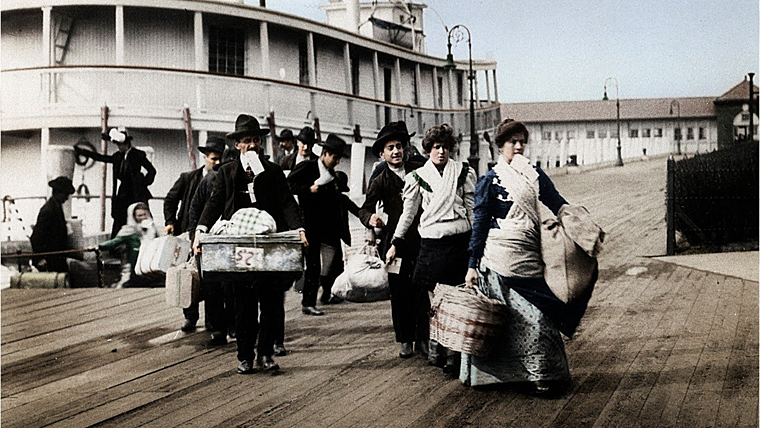
In 1910, like a lot of other refugees from Eastern Europe, my grandfather arrived in America at Ellis Island in New York harbor. Twelve years of age, he had spent 38 days in steerage on a freighter, looking after his eight-year-old sister. Steerage, for those of you unfamiliar with the term, is the lowest habitable space in the hull of a ship. There were no windows, no fresh air, no heat. The shaft from the engine to the propeller runs through steerage, so there was the constant noise and thrumming of the engines. The floor was always wet and cold.
Packed in with other refugees, he had fled the pogroms of western Russia. Pogrom, for those of you unfamiliar with the term, is the word used to describe the state-sanctioned terror and harassment of members of the Jewish community that regularly took place in that period of time. He and the other children in the family would hide in a pit under the floor boards of their small home when the pogroms were carried out, while his beleaguered parents above had to bribe the thugs or take the beatings.
After his arrival, my grandfather met up with other family members, and lived in the basement of a New York City tenement. Tenement, for those of you unfamiliar with the term, was the turn-of-the-20th-century equivalent of housing for the poor. These cheaply built four-, five- or six-story buildings would house families of six or eight in a one-room apartment. The basement in which my grandfather lived had two small windows at sidewalk level atop walls constantly damp and covered with mold. Heat? Fugeddaboutit!
He spoke no English upon arrival, only Yiddish. Yiddish, for those of you unfamiliar with the term, is a unique variation of German, Polish and European languages, commonly spoken within the Eastern European Jewish communities of the time. Many Yiddish words have become part of the American lexicon, now as common as bagels. “Putz, schmuck, schlemiel”…these are just a few. “Oy,” an expression of dismay, probably passed my grandfather’s lips quite often as he shared a cot with two brothers and one sister.
In time, like others of his generation, my grandfather built a life in America. He taught himself to read, eventually becoming a clerk in a freight-forwarding company. Freight-forwarding, for those of you unfamiliar with the term, is the process of arranging for shipments that arrive in a port to be passed through customs, released and delivered to the designated addressee. He married, had two sons and eventually became the owner of the company. After World War II, my father joined the business, and with my mother helped raise his own family, including me. My wife and I have gone on to raise a family, our two daughters, now each 35 years old. And they, too, will have families.
There is a picture of my grandfather hanging in the hallway of our home. When you leave your home a 12-year-old refugee, you leave with the clothes on your back and little else. I don’t even know my true family name. Like all of us, my family lineage stretches back endless generations. The hardships they faced and overcame have led directly to the blessings of this life, and as I stand before my grandfather’s photo, I feel deep and simple gratitude. Gratitude – and I know you are familiar with the term – means feeling appreciation and thanks for the sacrifices made by others. All of us, especially in this place, at this time, have so much to be thankful for. Happy Thanksgiving, Sonoma.